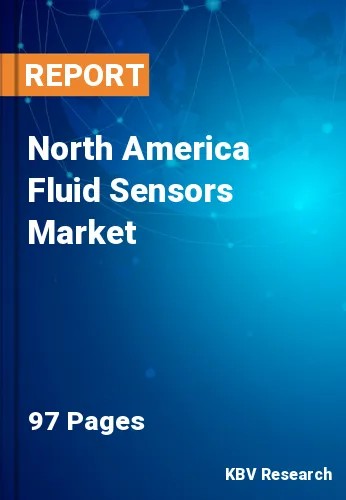The North America Fluid Sensors Market would witness market growth of 6.2% CAGR during the forecast period (2022-2028).
A fluid sensor is an electrical system that measures or controls fluid and gas flow through pipes and tubes. Fluid sensors are typically used with gauges to produce measurements, but they can also be integrated with computers and digital connections. Pressure, temperature, level control, and the amount of fluid going through them, among other things, are all measured with them. Fluid sensors are utilized in many different industries, including chemical, water and wastewater, power generation, food and beverage, oil and gas, and automotive. In fluid or gaseous mediums, fluid sensors measure pressure, flow, temperature, and fill level.
A Conductive Sensor is another typical form of fluid level sensor. This fluid level sensor can only be used with fluids that conduct electricity. A power source, usually of a low voltage, is included in a Conductive Sensor. Within the container, at least two conductors are inserted. A conductive fluid would come into contact with both a larger and a smaller electrode when it reaches a specific point, completing a circuit and activating an internal switch. With highly dangerous substances or in systems where the use of electricity is not feasible or possible, pneumatic sensors are a typical occurrence. This is because the sensor does not come into close touch with the fluid.
Water leakage in distribution systems can be reduced using sensors, technologies, methods, or procedures. For leak detection, isolation, and location in water distribution networks, an optimal sensor deployment based on evolutionary algorithms is proposed. With 31 demand nodes, one reservoir node, and 34 pipes, the recommended method was tested on the water supply network of Hanoi, Vietnam. A monostatic antenna working at a central frequency of 1.5 GHz is utilized in a Ground Penetrating Radar, which is a technique used for leak detection in water distribution networks.
Researchers are interested in fluid leak detection not just because leaks are ubiquitous in industries and services, but also because it is an issue that has piqued their attention. Indeed, leakage rates in water or gas supplies, chemical or thermal facilities, sea-lines, or cooling/heating systems can result in significant economic losses and, more importantly, environmental contamination, putting human, animal, and plant lives at danger. This last concern has resulted in more stringent national and international environmental rules of varying degrees of severity.
The US market dominated the North America Fluid Sensors Market by Country in 2021, and would continue to be a dominant market till 2028; thereby, achieving a market value of $4,221.4 Million by 2028. The Canada market is anticipated to grow at a CAGR of 8.7% during (2022 - 2028). Additionally, The Mexico market would showcase a CAGR of 7.7% during (2022 - 2028).
Based on Type, the market is segmented into Flow Sensor and Level Sensor. Based on Technology, the market is segmented into Non-contact and Contact. Based on End-user, the market is segmented into Power & Utilities, Automotive, Oil & Gas, Water & Wastewater, Food & Beverages, Chemical, and Others. Based on countries, the market is segmented into U.S., Mexico, Canada, and Rest of North America.
Free Valuable Insights: The Global Fluid Sensors Market is Estimated to reach $20.2 Billion by 2028, at a CAGR of 6.9%
The market research report covers the analysis of key stake holders of the market. Key companies profiled in the report include ABB Group, Schneider Electric SE, Sick AG, Robert Bosch GmbH, Texas Instruments, Inc., NXP Semiconductors N.V., Siemens AG, Honeywell International, Inc., Emerson Electric Co., and Rockwell Automation, Inc.
By Type
By Technology
By End User
By Country
Our team of dedicated experts can provide you with attractive expansion opportunities for your business.

